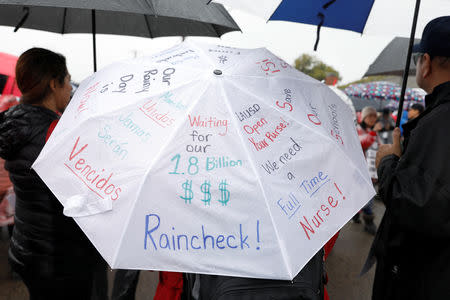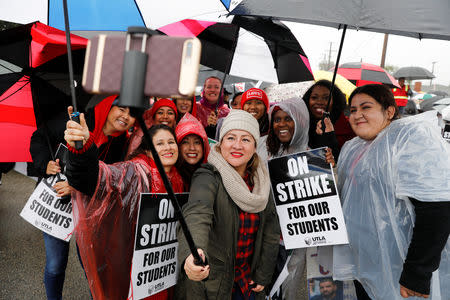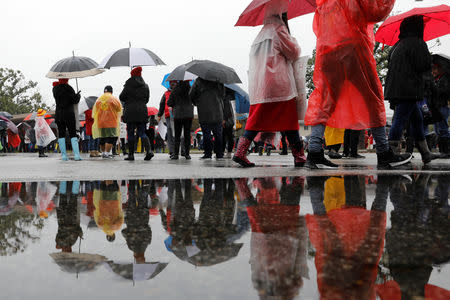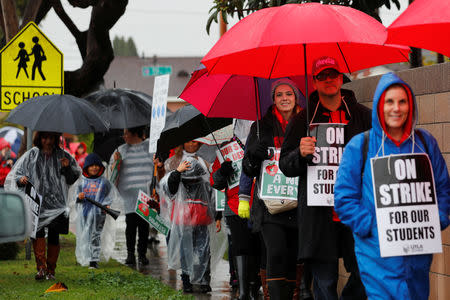Los Angeles mayor to mediate in talks to settle first teachers' strike in 30 years
By Steve Gorman and Alex Dobuzinskis LOS ANGELES (Reuters) - Negotiators for 30,000 striking Los Angeles teachers and America's second-largest school district have agreed to return to the bargaining table on Thursday, with Mayor Eric Garcetti acting as mediator, his office said. Wednesday's announcement of the breakthrough capped the third day of a strike that has disrupted classes for nearly 500,000 students as teachers pressed their demands for higher pay, smaller classes and more support staff. Representatives of the two sides - the Los Angeles Unified School District and the United Teachers Los Angeles - have not met since union leaders rejected the LAUSD's latest contract offer last Friday night, setting the stage for district teachers' first strike in 30 years. There was no immediate word from district officials to the overture for mediated talks, first unveiled by union leaders at a Wednesday night news conference. But Garcetti's office confirmed that both sides had agreed to resume face-to-face sessions on Thursday. Union officials said the mayor, who has voiced support for the teachers' cause, had met with the two parties on Wednesday. California's top education official, its superintendent of public instruction, Tony Thurmond, "has also been in touch with both parties and offered support," Arlene Inouye, chair of the union's bargaining team, told reporters. Thurmond could help to secure extra funding the district may need to close a deal. LAUSD Superintendent Austin Beutner has said the teachers' demands would strain the budget too much. Caputo-Pearl said the union was counting on Thurmond and Garcetti to make the case that funding could be found. "California is the richest state in the union," he told reporters. "The money is there for the kids." The teachers, who have been without a contract for nearly a year, walked off the job on Monday. School district officials have kept all 1,200 schools open on a limited basis with a skeleton staff, but attendance has been about a third of normal. RAINY RALLIES Thousands of striking teachers joined in boisterous rallies and pickets across the sprawling school district on Wednesday, although a third day of showers seemed unable to dampen their spirits, or those of parents who turned out in support. Huddled under an umbrella in a downpour, Diana Castillo, a teacher at Harbor City Elementary School, said she discounted assertions by Beutner, a former publisher and investment banker, that the district could not afford the union's demands. "He makes $350,000 a year, has a district car and a driver," she said. "The money's there." At another rally across town, teacher Elizabeth DiMartino said classrooms at her school in the San Fernando Valley had been decrepit for so long that "people think this bare minimum is normal in Los Angeles." She added, "We spend so much of our own money just to make the classrooms look presentable," and cited a lack of on-site nurses and instructors in art, music and physical education. The Los Angeles walkout follows a wave of teachers' strikes last year across the United States over pay and school funding, including work stoppages in West Virginia, Kentucky, Oklahoma and Arizona. Those represented battles between teachers' unions and Republican-dominated state governments focused on cutting costs, while the Los Angeles strike is unfolding in a Democratic-controlled state. Denver teachers could vote to strike by Saturday if no deal on a new contract is reached. Beutner said the district had proposed staff increases that would cost $130 million a year - more than county officials have said is available - while the union's demands would cost $800 million. The union wants a pay rise of 6.5 percent, but the district has offered a 6 percent hike with back pay. LAUSD teacher pay now averages $75,000, state figures show. (Reporting by Steve Gorman and Alex Dobuzinskis; Additional reporting by Dan Whitcomb in Los Angeles, Gina Cherelus in New York and Rich McKay in Atlanta; Editing by Peter Cooney and Clarence Fernandez)










